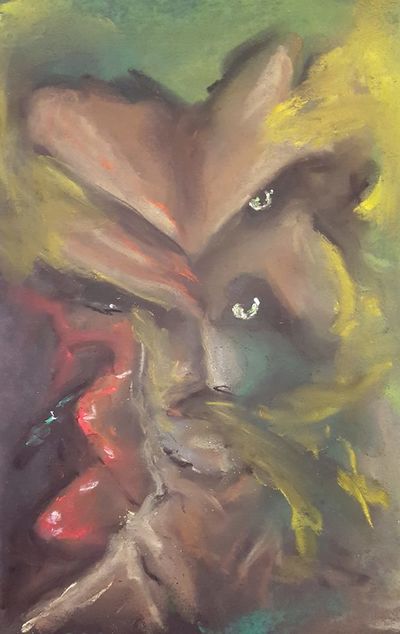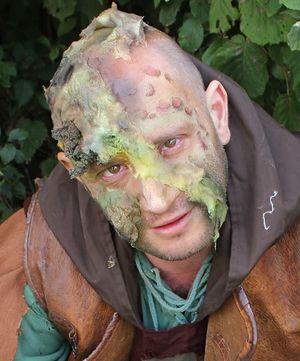Llofir
Eternal of Spring
Sobriquets
Most commonly Llofir is The Rotlord or the Lady of Spores. It generally uses "it" as a pronoun.
It is also known as The Quiet One, or The Great Fungus, or Wisdom of Dead Wood, but seems mostly unconcerned with what names mortals give it. It appears broadly immune to flattery, enduring it with quiet stoicism before ignoring it and moving on. Other names commonly used include End of Empires, Inevitable Circle, and Ruin.
Appearance
As with eternals such as Yaw'nagrah, Llofir is believed to be truly massive - an entire ecosystem with a single consciousness behind it. Where Llofir differs from other Spring eternals is that its body is composed of fungus and moulds - sometimes on an epic scale. It is known to 'bud' smaller, humanoid forms that are in some way vessels for its consciousness with which it can speak to mortals; many of these strange creatures serve as its heralds, guards and courtiers. They range in size from a few feet tall through dangerous animalistic creatures to massive, shambling horrors that move like a tide of animate matter.
Its heralds most often appear as humanoids infested with rot and fungus. Often quiet and slow-moving, their appearance is a little deceptive - they are actually creatures in their own right rather than reanimated flesh.
Concerns
The Quiet One is usually described as calm, placid and extremely long-sighted. Where other Spring eternals live in the moment, Llofir seems utterly disconnected from concerns of past and future. It in some way exemplifies ideas of natural rot, corruption, decomposition and decay - the way things tend to break down into simpler forms, from which new things arise. It is also fascinated with disease and sickness, and the way they cause healthy organisms to fall apart or become weak.
Some magicians believe that Llofir's interest in rot and decay extends beyond the physical, literal manifestation of decomposition and includes the philosophical idea that complex structures such as societies and empires also need to be periodically killed and broken down so that new societies can grow from the 'mulch' they leave behind. This would be a very sophisticated position for a Spring eternal to take, but not entirely inconsistent with the 'long view' that Llofir appears to take.
The eternal has several times expressed a dislike for the vallorn, and even offered aid in weakening or destroying it. It appears that the unquenchable wellspring of life that fills vallorn-infested areas is at odds with Llofir's focus on the cyclic nature of death, decay, and new life arising from the remnants of the old. In a similar vein, the Lady of the Toadstools expresses an uncharacteristic virulent hatred for things which inhabit dead flesh and prevent it rotting (such as the husks produced by Quickening Cold Meat or the transformation effected by Mark the Flesh Incorruptible). It offers boons to help destroy them or return them to their "natural" space in the cycle; on one occasion this involved investing the unliving husks created by Quickening Cold Meat with spores that quickly rotted the bodies inhabited by the winter spirits.
Recent History
In 380YE, Llofir was responsible for a wave of Spring magic that swept across newly-liberated Reikos. In the process, it claimed the region of Tamarbode for itself. In the years that followed, it resisted Imperial efforts to reclaim the region while simultaneously offering to provide assistance to the efforts to fight the vallorn. The Winter Solstice 382YE saw Llofir placed under enmity by the Conclave. Then in Summer 383YE, a combined operation by the Wolves of War and the Towerjacks ultimately destroyed Llofir's Garden and drove the eternal's forces back into the Spring realm. Llofir was less than pleased, to put it mildly.
Indeed, when the Archmage of Spring Ibiss Briarheart next sought parley with the End of Empires, in Winter 386YE, the eternal refused in no uncertain terms. Instead, it made an extreme demand of the Conclave - that it be granted amity with the intent that it would "ravage the Empire" in retribution for the destruction of its garden. Unsurprisingly, the Conclave refused to provide it with the opportunity to take revenge on Imperial citizens.
In Autumn 387YE, however, Ibiss made another attempt to reconcile the Empire and the Rot Lord. This time, Llofir's response appeared a little more measured. In the end however, the Empire did not meet the eternal's demands; they did however, remove the existing enmity as "a show of trust."
Boons
The Great Fungus has a number of boons that might interest Imperial magicians. It can offer aid with rituals that encourage decay and collapse, or the destruction of crafted goods or structures. It also has power to support attempts to renew damaged or ruined lands, or to bring forth new life from rot and decay. As a being fascinated with fungus and mushrooms, it can also offer boons related to replicating or enhancing the hallucinogenic or poisonous properties of many fungi. According to some sources, this interest can provide insight into the magic of Spring, or even into the nature of living creatures.
More than any other eternal except perhaps Yaw'nagrah, Llofir's realm bursts at the seams with magical substances. Often referred to as donahorti, they differ from those associated with the Green Mother both in their properties - related to ruin and renewal rather than chaos or fertility - and because they invariably take the form of fungus or fungal spores. Whisperspore, for example, takes the form of pale, powdery spores that can be inhaled to empower an adept of Spring lore to work their magic more easily, especially Spring magic that causes rot and renewal such as Turns the Circle. There have also been several cases of mushrooms gathered under Llofir's auspices that have produced powerful if sometimes unpredictable mind-altering substances.
Further Reading
- Mushroom, mushroom, mushroom - 387YE Winter wind of fortune detailing certain boons offered by Llofir especially to the Navarr
- Has reared himself a throne - 387YE Autumn plenipotentiary response
- I knew you were trouble - 384YE Winter plenipotentiary response
- Destroying angels - 383YE Summer Wind of War detailing the destruction of Llofir's garden in Tamarbode
- When all the land is in ruins - 382YE Winter Wind of Fortune including offers of aid from Llofir
- Bury the hatchet - 382YE Summer plenipotentiary response
- Our neighbours field - 380YE Autumn Wind of War involving the Citadel Guard attack on Llofir's garden
- A season of mushrooms - 380YE Summer Wind of Fortune discussing Llofir's "restoration" of Reikos

